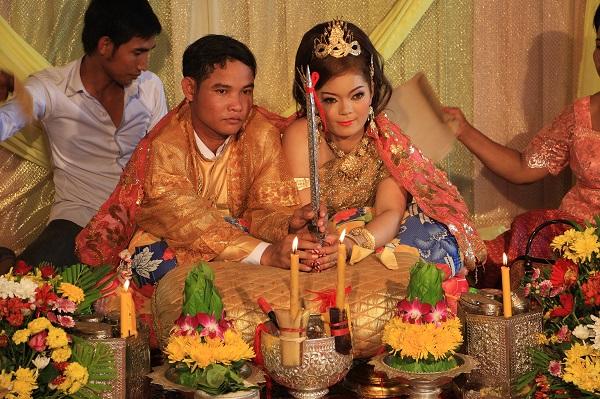
Khmer weddings: between Love, Respect, and Tradition
Attending a wedding, an anniversary, or even a simple family gathering is often a highlight and unforgettable moment of any trip. In Cambodia, it is not uncommon to witness a Khmer wedding ceremony, which is hard to miss with its large white and pink tents adorned with flowers.
These tents, often set up in the middle of the street, can host hundreds of guests and are responsible for traffic jams.
Traditionally, to symbolize the three jewels of Buddhism, Khmer weddings would last for three days. Today, this tradition has gradually faded, and the celebrations are condensed into a single day, although many customs are still maintained.
The Khmer wedding: The first steps

(A Khmer wedding is planned well in advance and follows a strict list of traditions.)
The introduction between the two families follows a precise ritual: to inform the bride’s family that the groom’s family wishes to marry their son to their daughter, an elderly and respected woman is appointed as an intermediary. Her role is to visit the bride’s mother to introduce the idea that the groom’s family wishes to marry their son to her daughter.
The ritual involves three visits. On the third meeting, if the bride’s mother accepts the union of the two young people, the elderly woman then brings all the necessary ingredients to prepare the betel chew (betel leaf, areca nut, and other accessories), a traditional natural chewing gum that signifies the upcoming matrimonial bond.
The Proposal
The ritual doesn’t end there. Once the bride’s family has given permission for the young couple to see each other, the groom’s family designates not one, but three elderly and respected women. Once again, visits are organized between these women and the bride’s family to learn more about the future bride and her family.
A report is then provided at a family council meeting. If the agreement is reached, the bride’s father will formally demand a proposal and request the intervention of three respectable men—married and well-established—chosen by the groom’s family.
The meeting between these three men and the bride’s parents officially marks the proposal. During this time, the parents will take the opportunity to learn more about the groom.
The meeting of the future couple
After several weeks of waiting, the couple finally meets during the Dowry Presentation. The groom’s family visits the bride’s family, bringing gifts such as jewelry, food, flowers, and fabrics. As a form of engagement, the families chew betel together. The bride’s family offers a meal, and the couple exchanges rings or jewelry.
The wedding day

(The wedding always takes place at the bride’s home, but it is the groom’s family that is responsible for organizing all the festivities.)
A large tent is set up in front of the bride’s house to welcome guests. Traditional music starts playing as early as 6 AM.
A married couple from each family is chosen to meet the guests upon their arrival. They serve as role models for the event. Afterward, guests enter in an established order into a room set up for the reception ceremony. The groom and his groomsmen are the first to take their places on a carpet at the center, followed by the bride and her bridesmaids. Then, the parents enter, and the young couple bows, placing their hands on a cushion as a sign of greeting and respect.
It is during this welcoming ceremony that gifts are presented to the couple: clothing, decorative items, as well as gold pieces and diamonds.
To purify the couple from the impurities they have accumulated before the union, two musicians, a man and a woman representing angelic figures, cut a lock of hair from both the bride and the groom. This ritual signifies the presence of the divine during the ceremony!
In the next room, a well-stocked buffet, candles, and incense are prepared. Everything is set up to honor the ancestors and ward off evil spirits.
The couple is joined by seven married couples whose presence ensures that no bad spirits can approach the newlyweds. Once everyone is settled, a Buddhist representative recites prayers.
Marriage beyond a civil institution
In Cambodia, while marriage is a civil institution, the religious ceremony holds far greater importance for the people. Monks are invited, and they typically recite prayers while sprinkling the couple with scented holy water. This is a sign of happiness and longevity for the couple!
Once the guests have finished offering their advice and blessings, the Buddhist representative ties the couple’s hands together with a red cotton thread—this is the union ritual! It signifies that the couple is married and bound forever, for better or for worse.
Guests then throw areca flower petals over the couple before heading to a separate area built outside the house, where a large feast awaits.
The newlyweds, along with their bridesmaids and groomsmen, greet and serve the guests. As always, Cambodian beer is served, and traditional dances are performed to joyful songs!
At the end of the celebrations, guests give the couple a small amount of money—typically around $20-30—to help them begin their new life. It is also common for someone to record the names of the guests and the value of their gifts so that the hosts can reciprocate with appropriate gifts when they are invited to another wedding.
The festivities continue throughout the day in a lively and joyful atmosphere. Smiles, laughter, traditional dances, and songs animate the event, creating an unforgettable experience!
Attending a Khmer Wedding
During your trip to Cambodia, through your encounters, you may be invited to a traditional Khmer wedding. Attending a Khmer wedding will be a unique cultural experience, giving you an opportunity to immerse yourself in the heart of Cambodian traditions. Your guide can accompany you and advise you on the proper gestures and behaviors to observe.